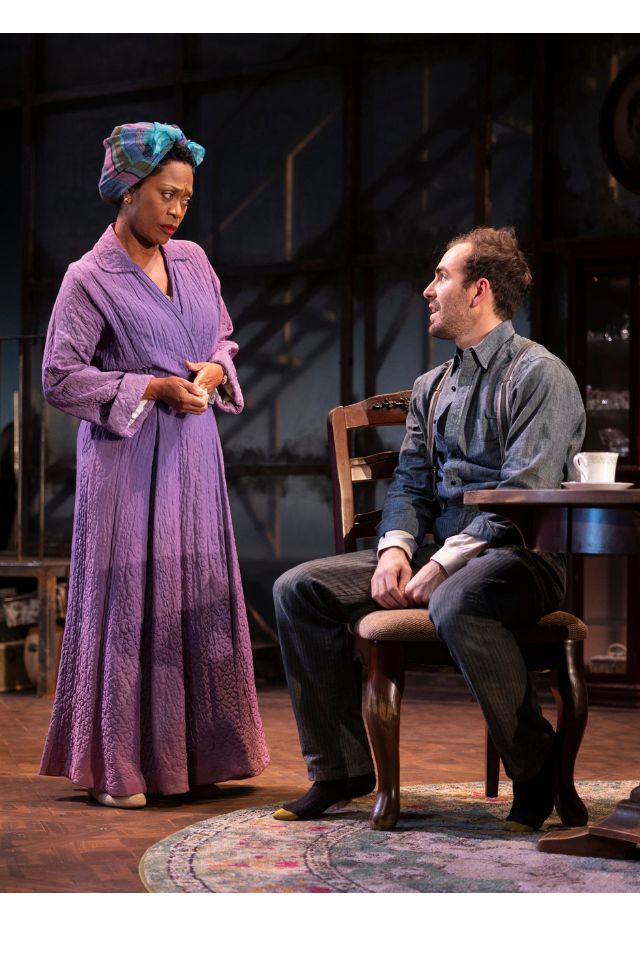
Review: ATC Production Breaks More Than Glass Figurines
THE GLASS MENAGERIE delivers a solid and heartbreaking cast at Arizona Theatre Company.
By Robert Encila-Celdran. Originally published on BroadwayWorld.com.
We can never know how Tennessee Williams might have fared had he remained a poet. By happy chance, his lyric acuity parlayed into a singularly rare narrative form, revolutionizing the theater landscape post-World War II. If the structure now seems trite or old-fashioned, the playwright’s motif remains significant, even in the remote confines of the Sonoran Desert.
A memory play, THE GLASS MENAGERIE allows ample space for poetic innovation, inspiring countless abstractions since its Broadway debut in 1945. Though not all attempts prove commercially rewarding, certain theater companies delight in reimagining beloved classics. Broadway’s experimental revival in 2017 was a good case in point, where Sally Field’s knockout performance had no chance of saving the stripped-down version from its premature closing. (As recently as last summer, West End showcased Amy Adams as Amanda Wingfield. That, too, garnered mixed reviews.)
ATC’s production appears to play it safe, at least with design elements – a notable departure from the stunning deconstruction of the same masterpiece on the same stage some years ago. But “safe” can be a good thing; Josafath Reynoso’s work is no less impressive, sporting a handsome box set and a naturalistic interior, save for the large grid of translucent walls that make Williams’ iconic fire exit visible. The apartment is neither cramped nor run-down, as the script would suggest, but we’re suspending judgment in light of aesthetics designed for a large proscenium. The mood is absorbing, enhanced by Masha Tsimring’s lighting design, which is artfully suited to Williams’ prescriptive vision (he wanted it “dimly lit”) and evokes a deep longing and loneliness.
For the record, director Chanel Bragg didn’t have to secure a movie star to manifest a compelling production of her own. She features a charismatic powerhouse in Lillie Richardson, who submits a resounding performance as the flamboyant matriarch. Ms. Richardson strides with regal confidence and speaks with a stately optimism that defies her fear of an austere future. Amanda has conjured traditional perceptions of an imperious monster, but Lillie Richardson plays against that tendency, showing us an overzealous mother who only wants the best for her children. Indeed she fluctuates between illusion and reality, and in Richardson, we see Amanda’s inability to distinguish them as a tragedy.
Chanel Bragg’s delicate guidance ensures a committed and articulate ensemble that earned a well-deserved standing ovation on Opening Night. As Tom Wingfield, Aaron Cammack paints a nuanced portrait of an adult son torn between his moral duty and the nagging desire to abscond from his mother’s overbearing influence. He opens with a speech akin to a Shakespearean prologue, reflecting the playwright’s dramatic warning that he is about to reveal the truth “in the pleasant disguise of illusion.” Tom is a free spirit stuck in the struggle of conventional life who dreams of escaping to a world of adventure and poetry. An intuitive actor, Mr. Cammack has tapped a clear distinction between rage and restraint. Given his fraught relationship with Amanda, it’s refreshing to find an occasional scene where they share a laugh, where he conveys a palpable affection for his mother, albeit shortlived.
Michelle Chin plays Laura Wingfield, our tragic hero. She evokes our sympathy as she lives a frightened and painfully shy existence. Michelle Chin’s Laura is so withdrawn as to be incapable of the slightest audacity, and her weak mental state renders her susceptible to abuse. She’s the opposite of her mother, whose anxiety worsens at Laura’s lack of agency. Laura breaks easily, like the glass unicorn she loves. It prompts a nagging question: Was Laura written to exist without a shot at ever defending herself? This inquiring mind wants to know. Is it a stretch for Ms. Chin to attempt to repel Amanda’s constant vexation?
Tennessee Williams gives us respite from the Wingfields’ dysfunctional reality with the introduction of the Gentleman Caller, Jim O’Connor. The playwright describes him as “a nice, ordinary young man” who happens to be Tom’s ambitious co-worker. Paul Deo Jr. makes quite the impression in Act 2, infusing Jim with comity and idealism previously unseen in the Wingfields’ tenement world. He is awkwardly charming and exhibits an impeccable comedic impulse. Mr. Deo assures us there is a way out of tribulation as long as one assumes a hopeful disposition.
Meanwhile, across the street, everyone hears the exquisite sound of music and the bona fide glee of people in a dance hall. To Tom Wingfield, it’s a painful reminder of the freedom he desires, made no less aggravating by the mocking neon sign that reads, “Paradise.”
When Tom returns from the future as a merchant marine, we are no less disturbed by the family’s dire affairs. This cast makes that pain unmistakably clear. It takes an astute director and a solid acting ensemble to elicit our empathy. Tom Wingfield is not only Tennessee’s stand-in; the entire cast is all of us.